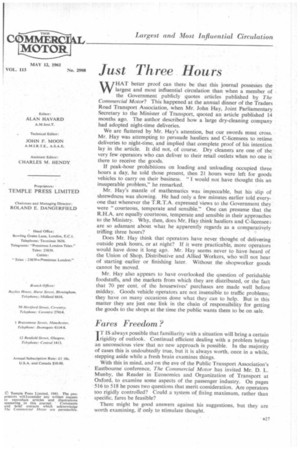Just Three Hours
Page 31

If you've noticed an error in this article please click here to report it so we can fix it.
WHAT better proof can there be that this journal possesses the largest and most influential circulation than when a member of the Government publicly quotes articles published by The Commercial Motor? This happened at the annual dinner of the Traders Road Transport Association, when Mr. John Hay, Joint Parliamentary Secretary to the Minister of Transport, quoted an article published 14 months ago. The author described how a large dry-cleaning company had adopted night-time deliveries.
We are flattered by Mr. Hay's attention, but our swords must cross. Mr. Hay was attempting to persuade hauliers and C-licensees to retime deliveries to night-time, and implied that complete proof of his intention lay in the article. It did not, of course. Dry cleaners are one of the very few operators who can deliver to their retail outlets when no one is there to receive the goods.
ff peak-hour prohibitions on loading and unloading occupied three hours a day, he told those present, then 21 hours were left for goods vehicles to carry on their business. "I would not have thought this an insuperable problem," he remarked.
Mr. Hay's mantle of mathematics was impeccable, but his slip of shrewdness was showing. He had only a few minutes earlier told everyone that whenever the T.R.T.A. expressed views to the Government they were "courteous, temperate and sensible." One can presume that the R.H.A. are equally courteous, temperate and sensible in their approaches to the Ministry. Why, then, does Mr. Hay, think hauliers and C-licensee, are so adamant about what he apparently regards as a comparatively trifling three hours?
Does Mr. Hay think that operators have never thought of delivering outside peak hours, or at night? If it were practicable, more operators would have done it long ago. Mr. Hay seems never to have heard of the Union of Shop, Distributive and Allied Workers, who will not hear of starting earlier or finishing later. Without the shopworker goods cannot be moved.
Mr. Hay also appears to have overlooked the question of perishable foodstuffs, and the markets from which they are distributed, or the fact that 70 per cent. of the housewives' purchases are made well before midday. Goods vehicle operators are not insensible to traffic problems; they have on many occasions done what they can to help. But in this matter they are just one link in the chain of responsibility for getting the goods to the shops at the time the public wants them to be on sale.
























































































































